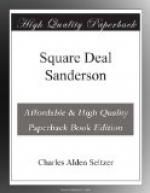Maison was short and pudgy, short of breath, with a pasty complexion.
“Will Bransford, eh?” he said, looking sharply at Sanderson over the table. “H’m. You don’t look much like your father.”
“Nor I don’t act like him, either,” smiled Sanderson. “For instance,” he went on at the banker’s quick look, “dad was slow; he wasn’t alive to his opportunities. How long has it been since the railroad came to Okar?”
“Five years.”
“Then dad was five years slower than he ought to have been. He ought to have seen what water would do to the basin. He didn’t—left that for me.”
“Meaning what?” asked Maison, as Sanderson paused.
“Meanin’ that I want to turn the Double A water into the basin. That’s what I came here to see you for. I want to mortgage the Double A to the limit; I want to build a dam, irrigation canals, locks, an’ everything that goes with it. It will take a heap of money.”
Maison reflected. “And you want me to supply it,” he said. “Yes, that project will require a large sum. H’m! It is—er—do you purpose to try to handle the project yourself, Mr. Bransford?”
“Me an’ Mary Bransford. I’ll hire an engineer.”
Maison’s cheeks reddened a trifle. He seemed to lose interest slightly.
“Don’t you think it is rather too big a thing for one man to handle—aided by a woman?” He smiled blandly at Sanderson. “I have thought of the water situation in the basin. It is my opinion that it might be worked out successfully.
“Why not organize a company—say a company composed of influential and powerful men like Silverthorn and Dale and—er—myself. We could issue stock, you know. Each would take a certain number of shares—paying you for them, of course, and leaving you in possession of a large block of it—say—forty per cent. We could organize, elect officers——”
“An’ freeze me out,” smiled Sanderson.
Maison sat erect and gazed haughtily at his visitor.
“No one has ever questioned my honesty,” he declared.
Sanderson smiled at him. “Nor I don’t. But I want to play her a lone hand.”
“I am afraid I wouldn’t be interested in that sort of project,” said Maison.
The thought that Maison would be interested—not publicly, but privately—made Sanderson grin. The grin angered Maison; he arose smiling coldly.
“I am sorry to have taken your time, Mr. Bransford,” he said, dismissing his visitor.
Sanderson did not give up. “My father left some money in your bank,” he said; “I’ll take it.”
“Certainly,” said the banker. He got a withdrawal blank and laid it before Sanderson.
“The amount is three thousand two hundred,” he said. “Just fill that out and sign your name and yon can have the money.”
Sanderson did not sign; he sat, looking at the blank, suddenly afflicted with the knowledge that once more the troublesome “Bransford” signature had placed him in a dilemma.




